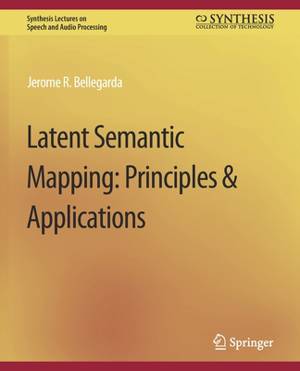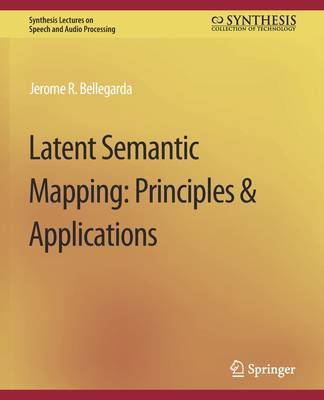
- Afhalen na 1 uur in een winkel met voorraad
- Gratis thuislevering in België vanaf € 30
- Ruim aanbod met 7 miljoen producten
- Afhalen na 1 uur in een winkel met voorraad
- Gratis thuislevering in België vanaf € 30
- Ruim aanbod met 7 miljoen producten
Zoeken
Omschrijving
Latent semantic mapping (LSM) is a generalization of latent semantic analysis (LSA), a paradigm originally developed to capture hidden word patterns in a text document corpus. In information retrieval, LSA enables retrieval on the basis of conceptual content, instead of merely matching words between queries and documents. It operates under the assumption that there is some latent semantic structure in the data, which is partially obscured by the randomness of word choice with respect to retrieval. Algebraic and/or statistical techniques are brought to bear to estimate this structure and get rid of the obscuring ""noise."" This results in a parsimonious continuous parameter description of words and documents, which then replaces the original parameterization in indexing and retrieval. This approach exhibits three main characteristics: -Discrete entities (words and documents) are mapped onto a continuous vector space; -This mapping is determined by global correlation patterns; and -Dimensionality reduction is an integral part of the process. Such fairly generic properties are advantageous in a variety of different contexts, which motivates a broader interpretation of the underlying paradigm. The outcome (LSM) is a data-driven framework for modeling meaningful global relationships implicit in large volumes of (not necessarily textual) data. This monograph gives a general overview of the framework, and underscores the multifaceted benefits it can bring to a number of problems in natural language understanding and spoken language processing. It concludes with a discussion of the inherent tradeoffs associated with the approach, and some perspectives on its general applicability to data-driven information extraction. Contents: I. Principles / Introduction / Latent Semantic Mapping / LSM Feature Space / Computational Effort / Probabilistic Extensions / II. Applications/ Junk E-mail Filtering / Semantic Classification / Language Modeling / Pronunciation Modeling / Speaker Verification / TTS Unit Selection / III. Perspectives / Discussion / Conclusion / Bibliography
Specificaties
Betrokkenen
- Auteur(s):
- Uitgeverij:
Inhoud
- Aantal bladzijden:
- 101
- Taal:
- Engels
- Reeks:
Eigenschappen
- Productcode (EAN):
- 9783031014284
- Verschijningsdatum:
- 31/12/2007
- Uitvoering:
- Paperback
- Formaat:
- Trade paperback (VS)
- Afmetingen:
- 190 mm x 235 mm
- Gewicht:
- 204 g

Alleen bij Standaard Boekhandel
+ 69 punten op je klantenkaart van Standaard Boekhandel
Beoordelingen
We publiceren alleen reviews die voldoen aan de voorwaarden voor reviews. Bekijk onze voorwaarden voor reviews.











